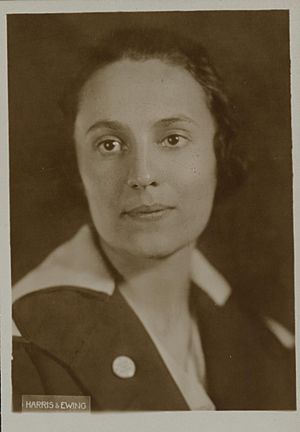Nina Samorodin facts for kids
Quick facts for kids
Nina Samorodin
|
|
|---|---|
 |
|
| Born | Kyiv |
| Alma mater | |
| Occupation | Suffragist |
Nina Samorodin (born July 4, 1892 – died November 28, 1981) was an important activist. She worked for both workers' rights and women's rights. Nina was born in Kyiv, which was then part of Russia, but is now Ukraine. She came from a Jewish family.
Nina went to Kiev University and got a good education. This was a special chance for Jewish people at that time. In 1914, she moved to the United States. There, she became very active in helping workers and fighting for women's right to vote. She was a factory worker and later helped organize the Shirt Makers’ Union in Philadelphia. Nina is best known for her work with the National Woman's Party. This group fought hard for women's suffrage, which means the right to vote.
Contents
Nina's Family Life
Nina Samorodin married Anthony Ramuglia in 1919. He was a manager for a labor union. After they got married, Nina started using his last name. She became known as Nina S. Ramuglia.
In 1923, they had a son, also named Anthony Ramuglia. By 1938, the family lived in Los Angeles, California. Later, around 1958, they moved to Pasadena, California. Nina Samorodin passed away in Fresno, California, in 1981.
Fighting for Women's Rights
Nina Samorodin wrote about how she became a suffragist. A suffragist is someone who believes women should have the right to vote. She wondered why women were not seen as equal to men in society. Some people told her that men and women were not mentally equal.
Nina started to research the differences between males and females. She believed that working women should speak up for themselves. She felt they deserved to be represented fairly.
Time at Occoquan Workhouse
On September 13, 1917, Nina Samorodin joined a peaceful protest. She carried a banner to one of the White House gates. She was accused of blocking traffic. Because of this, Nina was arrested and sent to jail. She spent thirty days in the Occoquan Workhouse in Virginia.
While she was in prison, another suffragist, Mary Winsor, said that the women in jail would sing. They sang the "Occoquan Song," which Nina Samorodin set to Russian music. Nina demanded better healthcare and treatment while she was there. Reports said that the prisoners did not have good hygiene. They were given bad food and were sometimes beaten. They did not get proper medical care.
Nina's sister, Vera, visited her and saw that her health was getting worse. Vera asked the Russian ambassador for help. She hoped Nina could be called a "political prisoner" instead of just an "inmate." This might get her better treatment. After Nina was released in the fall of 1917, she went to New York. She taught a Russian language class at the Rand School of Social Science.
An Organizer's Busy Life
In September 1918, Nina Samorodin became an organizer. She worked for a branch of the International Ladies' Garment Workers' Union. Her job was to visit factories in Little Italy, New York City. She wanted to help the workers there form a union. A union is a group of workers who join together to protect their rights.
In an article called "The Quiet Life of an Organizer," Nina explained that the union was worried about sending her. Other organizers had been attacked. But Nina insisted on going. She faced many challenges trying to organize the factories. Once, three employers attacked her. The boss even started to choke her. Nina said that other women with her fought back. They jumped on the boss while others called the police. Nina and the women got away, but the boss threatened them. He said, "We will get you yet." Nina also shared another story. A different boss threatened to throw her out a third-story window if she tried to organize his factory. He even said it would be his second murder.
Later Activities
After the 1920s, Nina Samorodin changed her focus. She spent less time with the National Woman's Party. Instead, she worked on communist activities in America. Nina became the secretary-treasurer of the Council for the Protection of the Foreign Born. This group helped immigrants who were thought to be communists in America.
In 1927, Nina Samorodin invited W.E.B. DuBois to join the council's advisory board. However, he did not accept her offer. In 1948, during a time when many Americans were worried about communism, Nina Samorodin's name was mentioned. It appeared in a government report about "Un-American Activities."
Images for kids
 | Mary Eliza Mahoney |
 | Susie King Taylor |
 | Ida Gray |
 | Eliza Ann Grier |





